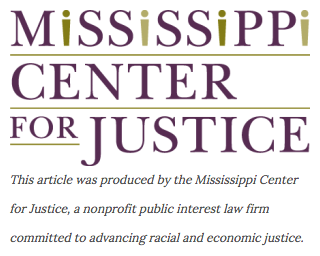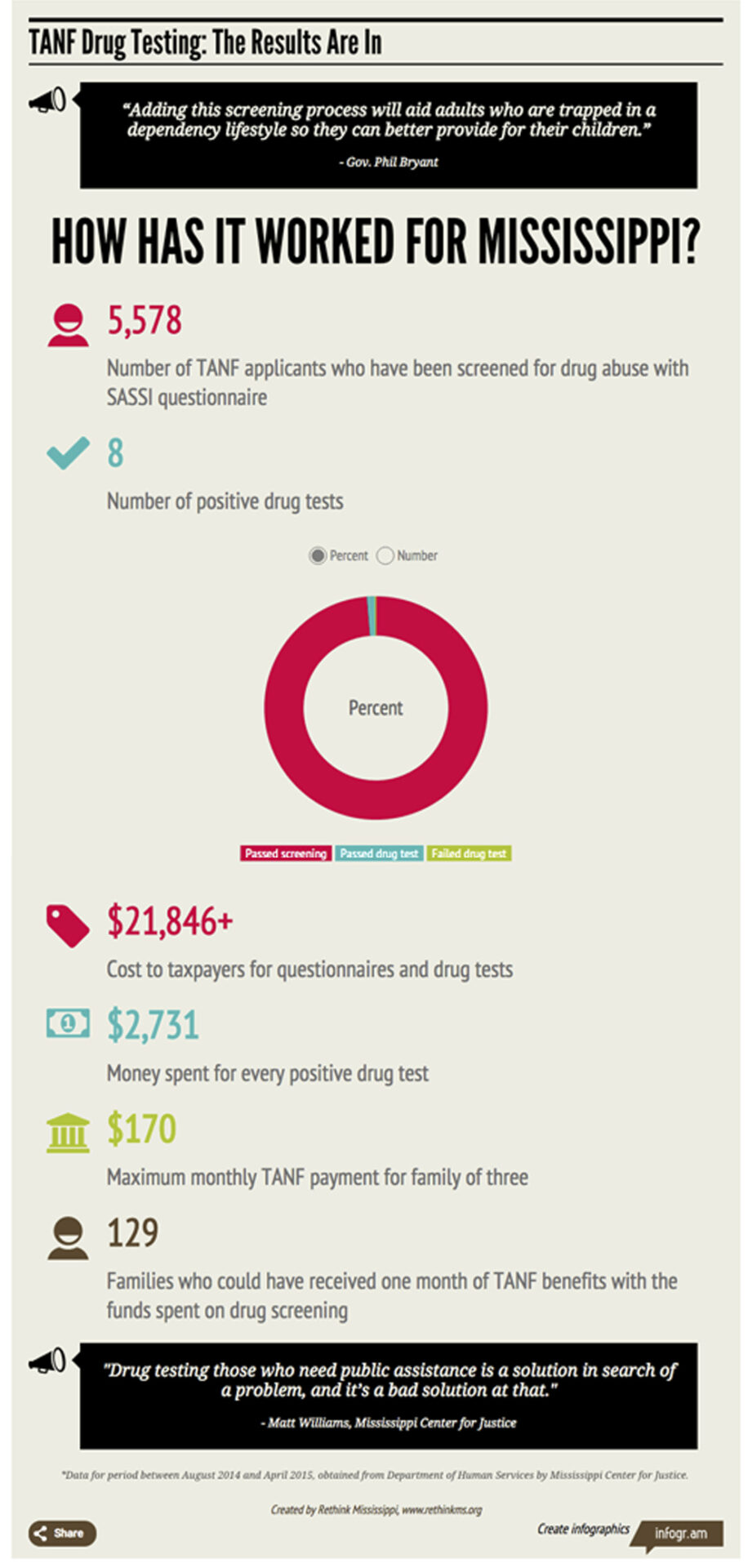Mississippi has screened 5,578 TANF applicants for drug use since August. Only eight (0.14 percent) have tested positive.
Mississippi does not offer many lifelines to families who fall onto hard times. One of the few is Temporary Assistance for Needy Families (TANF), the cash assistance program created in Congress’s bipartisan welfare reform legislation of 1996.
 Contrary to popular belief, TANF is not an “entitlement” that goes to everyone living in poverty. Of the 720,000 Mississippians beneath the poverty line, fewer than 20,000 receive assistance from TANF. Two-thirds of the recipients are children whose parents are subject to strict work requirements and time limits.
Contrary to popular belief, TANF is not an “entitlement” that goes to everyone living in poverty. Of the 720,000 Mississippians beneath the poverty line, fewer than 20,000 receive assistance from TANF. Two-thirds of the recipients are children whose parents are subject to strict work requirements and time limits.
TANF is designed to provide a last resort for the state’s poorest families. It will not lift them out of poverty – maximum benefits only provide about $170 a month for a family of three – but can mean the difference between making rent or facing eviction.
However, following the lead of other conservative states, Mississippi’s lawmakers decided to place another barrier between needy families and the modest support that TANF has to offer. Since August 2014, all of Mississippi’s TANF applicants have been forced to submit to a drug screening before receiving a single dollar of assistance.
The reasoning behind a drug screening requirement is, at best, dubious and, at worst, prejudiced. Proponents claim that they are helping those suffering from addiction, but there is no evidence to suggest that TANF recipients are more likely than the general population to use drugs. There is also no evidence that public funds were being used to purchase drugs. The slew of states with similar laws had only turned up a handful of positive drug tests. Nevertheless, the drug screening mandate passed the Legislature with large majorities and was signed enthusiastically by Governor Phil Bryant.
The Process
Under the process lawmakers adopted, all new applicants must take a questionnaire to determine the likelihood that they use drugs. Those flagged as probable users are then tested for prohibited substances. To continue the application process, they must test negative.
An applicant who tests positive for drugs is given the opportunity to go to rehabilitation, after which he or she must test negative to receive benefits. Anyone who fails to comply with any of these requirements will not be eligible for TANF.
Policymakers chose the Substance Abuse Subtle Screening Inventory (SASSI) to be their screening questionnaire. The survey asks a series of true/false questions such as these to assess likelihood of drug use:
- “Crying never helped anything.” True or False
- “People laugh at things sometimes.” True or False
- “I do not like to sit and daydream.” True or False
- “At times I feel worn out for no special reason” True or False
However, the developers of the SASSI believe that public assistance drug screening is a misuse of its survey instrument:
The purpose of the SASSI is to help people who have substance use disorders. To use the SASSI to discriminate against individuals, such as disqualifying job applicants or to deny public assistance, violates the purpose of the SASSI and is a violation of the Americans with Disabilities Act… When public assistance is made contingent on participation in the assessment and treatment process, it increases the risk for violations of ethical principles and applicants’ rights.
The SASSI Institute also makes clear that the test is “…not a measure of the use of controlled substances.” Rather, the survey identifies individuals who may suffer from addiction and dependency. Furthermore, the test isn’t tailored to the abuse of illicit drugs: it indicates an abuse disorder for all substances, including those that are legal, such as alcohol.
(It should be noted that the SASSI Institute was well aware of the purpose for which its instrument would be used in Mississippi. They accepted the state’s payment and provided training to Department of Human Services staff on how to administer it.)
While opponents — including my organization, the Mississippi Center for Justice (MCJ) — were not able to stop the bill or the adoption of this flawed survey, we were able to mitigate some of its cruelest consequences. The original regulations written by the Mississippi Department of Human Services (MDHS) initially failed to include mechanisms that would protect children from a negative impact if their parents were unable to comply with the law. If an adult tested positive, then their children would have been cut off from assistance. There was also no provision for transportation or childcare assistance for adults who were ordered to enter drug rehabilitation.
At our request, MDHS held a public hearing at which MCJ and other advocates testified on these issues. MDHS responded positively and ensured that assistance meant to benefit children would continue to flow to the home through a protective payee. They also promised to provide critical support services allowing adults to comply with the requirements.
The Results
In order to find out how the testing mandate was working, my colleagues and I filed a public records request with MDHS. Here is what we received:
August 2014 to April 2015
- Total Number of Applicants who completed SASSI questionnaire: 5,578
- Total Identified as High Likelihood for Substance Abuse: 72
- Total who submitted to a Drug Test: 72
- Total Number who Tested Positive for Drugs: 8
- Total Number who Tested Negative for Drugs: 64
- Total Number of False Positives: 1
- Total Number Receiving Sanction or Denied benefits due to Drug Testing Non-Compliance:“NOT TRACKING”
Since August, 5,578 TANF applicants have taken the SASSI. Only 1.3 percent (72) of new applicants were identified by the questionnaire as having a high probability of substance dependence. Of those, eight tested positive for prohibited substances — a mere 0.14 percent of the TANF applicants over that time.
For that, the state of Mississippi spent $18,750 on questionnaire kits from The SASSI Institute. The Clarion-Ledger reported that the state also paid $43 per drug test, for a sum of $3,096. That means at least $21,846 (not including administrative or treatment costs) has been diverted from the state’s federal TANF block grant to pay for drug screening — money that could have provided one month of benefits for 129 families.
The data provided by MDHS revealed another alarming fact: the agency is not tracking the number of TANF applicants/recipients who are sanctioned or denied benefits because of failure to comply with drug screening requirements initially or at any time during treatment. Data retrieved from the state of Utah regarding its TANF drug screening law showed that as many as 251 people were denied benefits or sanctioned for the initial reporting period for failing to comply with the onerous requirements of the policy. Without data on noncompliance, the policy’s effect on Mississippi’s most marginalized families cannot be fully assessed.
However, the MDHS data does confirm what we suspected all along: drug testing those who need public assistance is a solution in search of a problem. Given the flawed use of the SASSI survey, it’s a bad solution at that.
We hope the release of these results can revive public discussion about the law. No policy should require Mississippians to prove their innocence merely because they need financial assistance. Any of us can fall on hard times, and those who do deserve to access public programs without the burden of baseless suspicion or stigma. It’s time for Mississippi’s lawmakers to take this failed policy off the books.
By the Numbers

 Matt Williams is a Policy Associate in the Mississippi Center for Justice’s Biloxi office, where he conducts policy analysis and research for the Center’s multiple statewide advocacy campaigns. He holds both a B.A. and M.A. in Political Science from the University of Southern Mississippi. You can contact Matt at mwilliams@mscenterforjustice.org.
Matt Williams is a Policy Associate in the Mississippi Center for Justice’s Biloxi office, where he conducts policy analysis and research for the Center’s multiple statewide advocacy campaigns. He holds both a B.A. and M.A. in Political Science from the University of Southern Mississippi. You can contact Matt at mwilliams@mscenterforjustice.org.
Rethink Mississippi is an outlet for insight, analysis, and commentary about the issues facing Mississippi’s rising generation — written by people who are committed to making a difference in the state. RM is sponsored by the William Winter Institute, which works with communities in Mississippi and around the world to end all discrimination based on difference.
